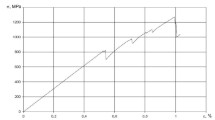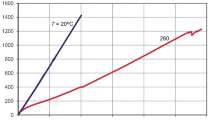Abstract
On the basis of the complete equation of bending, we establish the refined mechanical characteristics of a carbon-filled plastic under bending as functions of temperature by taking into account the effect of rotation of reactions in the supports. We also show that friction in the supports affects the fracture process in specimen subjected to bending.
Similar content being viewed by others
References
N. A. Shaposhnikov,Mechanical Testing of Metals [in Russian], Gostekhizdat, Moscow-Leningrad (1951).
GOST 9550-81, Plastic Materials. Methods for the Determination of the Elasticity Modulus under Tension, Compression, and Bending [in Russian], Introduced on 01. 07. 81.
A. V. Bogomolov, V. A. Borisenko, and A. N. Mishkin, “Evaluation of the parameters of rods with large deflections tested by bending,”Probl. Prochn., No. 6, 132–139 (1988).
GOST 4648, Plastic Materials. A Method for Testing by Static Bending [in Russian], Introduced on 01. 01. 73.
E. P. Popov,Theory and numerical Analysis of Flexible Elastic Rods [in Russian], Nauka, Moscow (1986).
Additional information
Institute for Problems of Strength, National Academy of Sciences of Ukraine, Kiev, Ukraine. Translated from Problemy Prochnosti, No. 1, pp. 139–141, January–February, 1999.
Rights and permissions
About this article
Cite this article
Bogomolov, A.V., Borisenko, V.A. & Fedchuk, V.K. Refining the high-temperature strength characteristics of composite materials under bending. Strength Mater 31, 105–106 (1999). https://doi.org/10.1007/BF02509747
Received:
Issue Date:
DOI: https://doi.org/10.1007/BF02509747




